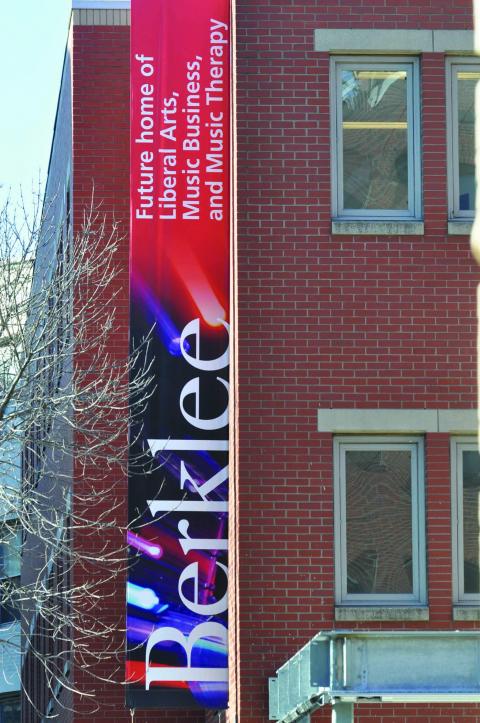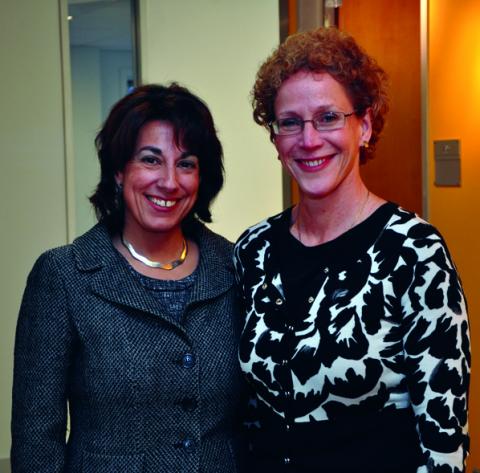Haviland Street Building Opens

Haviland Street Building Opens
Phil Farnsworth

From the left: Liberal Arts Department Chair Camille Colatosti and donor Elizabeth Boland
Phil Farnsworth
Expansion and enhancement of facilities are the first of the three aims of the Giant Steps capital campaign. The successful campaign is currently three-quarters of the way toward meeting its $50 million goal, and of that figure, $20 million is earmarked for facilities improvements. The campaign's two additional goals include increasing scholarships and fostering innovative educational programs.
Having adequate space has long been a challenge at Berklee. But with the opening of the 7 Haviland Street building-the new home for three of the Professional Education Division's five departments: Liberal Arts, Music Business/Management, and Music Therapy-the college has achieved partial relief for this longtime space crunch.
"On a campus where space is so desperately needed, we're fortunate to be able to expand and enhance the Professional Education Division," says Darla Hanley, the dean of the Professional Education Division. "It will allow us to showcase the division and also provide much-needed space for classrooms, faculty offices, and meeting spaces. The building will change how we teach, how students learn, and how the faculty interacts."
The newly renovated space is unique and hip and has an industrial feel that's in sync with the college's cutting-edge aesthetic. Three of the building's key rooms have been financed in part by the generosity of the Teresa Koster Charitable Fund, the Hirschhorn Family, and Elizabeth Boland. The Haviland Street building will also house the Berklee Writing Center, Berklee's English as a Second Language Program, an Africana Studies Room, conference and seminar rooms, and a cafe.
Presidential Advisory Council member and Berklee's Annual Encore Gala cochair Teresa Koster, who created a permanently endowed scholarship to support Berklee's music therapy majors, made a gift for a new music therapy resource room. "My grandfather succumbed to Alzheimer's disease," Koster says. "I think if there had been something like [Berklee's music therapy program] at that time, it might have helped him." Koster is also the division president for Gallagher Koster, a division of Arthur J. Gallagher Risk Management Services. Koster notes that the new music therapy space will also improve the department's visibility. The resource room-which will house books, scores, instruments, and other materials to aid musical therapy work-will serve as a place for music therapy students and faculty members to gather, exchange ideas about clinical sessions, and discuss practices and trends in the profession.
The donation from Berklee Trustee Charles Hirschhorn has funded the Professional Education Division Publishing Room, which will serve as the home base for Berklee's literary magazine FUSION and theMusic Business Journal. "It should be an exciting room in the coming decades," says Hirschhorn, the president of Fountain Productions, an independent TV and film production company. "Obviously, there are a lot of changes going on in [TV and film] right now-not dissimilar to what's going on in the music business. The evolution of technology and the distribution of media [are] having a dramatic effect on all our lives."
A member of Berklee's Presidential Advisory Council, Elizabeth Boland made a contribution to support the office for the Liberal Arts Department chair. As the CFO of Bright Horizons Family Solutions, Boland has personal reasons for supporting liberal arts at Berklee. "My collegiate experience was immeasurably enhanced by the liberal arts coursework I took," Boland says. "Not only did these classes provide welcome respite from data-intensive business classes, but they challenged me to think more broadly about education in general and to debate and discuss with people outside my usual circle. [These courses] helped me recognize the interrelationships between the business world I would soon enter and the social sciences, history, political science, literature, and language. At a college so specifically devoted to music education, I believe this broader educational view takes on even greater import."




